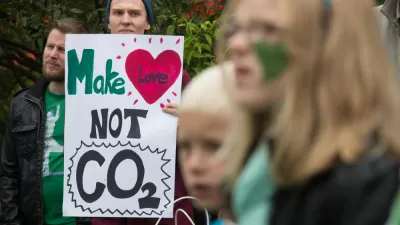If climate change is among the world's most pressing environmental issues, then Initiative 732 in Washington state should be watched by all concerned with the future of the planet. PBS NewsHour explores why the initiative is so controversial.
According to a recent poll, a majority of Americans are willing to pay a price on carbon emissions. An initiative on the Washington state ballot on November 8, I-732, does just that by applying a "carbon tax, starting at $25 per ton of CO2, about 25 cents per gallon of gasoline," states PBS NewsHour economics correspondent, Paul Solman, in this report (just over nine minutes) that aired on Oct. 20. [To access just the video without transcript, click here.]
By contrast, that's just less than twice the price charged for carbon allowances in the last auction in California's beleaguered cap-and-trade market.
Solman explores the controversy in a series of interviews to offer contrasting viewpoints on the measure. Some, like union president Jeff Johnson, have joined the business community to oppose the tax because of the added costs.
We have got an energy-intensive company, Kaiser Aluminum, out in Spokane, eastern side of our state. It’s the most efficient aluminum rolling mill in the world, right? With just a carbon price, they become less competitive with aluminum makers in other parts of the states, in other parts of the world.
One of the most interesting dialogs was with Michael Brune, executive director of Oakland-based Sierra Club, "which overruled local Washington state members to declare that the Sierra Club doesn’t support I-732," notes Solman. [See "Sierra Club Members Dispute Sierra Club Position," Seattle Weekly, Sep 30th, 2016].
"Aren’t you at all concerned that, if this initiative fails, in part because you folks don’t support it, it will set back the climate change movement?" asks Solman.
"No, not at all," responds Brune. "We believe that there’s a better way that helps us get off fossil fuels, but accelerates a transition to clean energy."
Brune opposes the 'revenue-neutral' aspect of the carbon tax, preferring that revenues be invested in carbon-reducing technologies and programs and also directed to low-income communities most impacted by pollution. Incidentally, that's the approach California takes with its Greenhouse Gas Reduction Fund.
A contrasting perspective is expressed by Harvard economics professor, N. Gregory Mankiw, former head of George W. Bush’s Council of Economic Advisers, who supports the revenue-neutral basis.
The first principle of economics is that people respond to incentives. And what a carbon tax tries to do is tries to harness that principle to get people to reduce their carbon footprint.
"But there is a case to be made, isn’t there, that we ought to invest in clean energy, and here’s a revenue source we can use to make those investments?" asks Solman.
If you give people the right incentives, then the private sector will be smart enough to make the right investments.
Solman continues the dialog with Brune, who rejects Mankiw's perspective. This is arguably the best part of the report because the viewer can understand the controversy among climate advocates. Essentially it comes down to an environmental and political approach pitted against one largely based on economics.
Solman gives the last word to environmental economist Yoram Bauman, founder and co-chair of Carbon Washington, the group behind the "Yes on I-732" campaign.
One of the things that I love about this policy is that it does have potential for bipartisan support. It’s not big government. It’s not smaller government. It’s just, how do we make the tax system fairer and more sustainable? That’s a powerful message that hopefully we can take around the country.
According to an August 17 report by the Northwest Progressive Institute, a group opposed to the initiative, poll results showed the initiative was in trouble, "faring worse than the other five initiatives certified to Washington’s ballot this year."
A Sept. 16 Crosscut article was more optimistic, calling the outcome a "nail-biter."
One reason that might negatively influence voters on the initiative is that gas taxes were increased 4.9 cents on July 1, the second part of an 11.9 cent gas tax increase approved by the legislature and signed by Gov. Jay Inslee in July 2015. Only Pennsylvania has a higher gas tax.
Also on PBS NewsHour: Why this conservative economist supports a carbon tax in Washington, by Paul Solman, October 20, 2016
Related on Planetizen:
- Why Don't Environmentalists Support Washington's Carbon Tax Measure?, September 19, 2016
- Citizen's Carbon Tax Initiative Goes Before Washington State Senate, February 22, 2016
FULL STORY: Pay for carbon pollution? Why some environmentalists don’t support this state tax

Maui's Vacation Rental Debate Turns Ugly
Verbal attacks, misinformation campaigns and fistfights plague a high-stakes debate to convert thousands of vacation rentals into long-term housing.

Planetizen Federal Action Tracker
A weekly monitor of how Trump’s orders and actions are impacting planners and planning in America.

Chicago’s Ghost Rails
Just beneath the surface of the modern city lie the remnants of its expansive early 20th-century streetcar system.

Bend, Oregon Zoning Reforms Prioritize Small-Scale Housing
The city altered its zoning code to allow multi-family housing and eliminated parking mandates citywide.

Amtrak Cutting Jobs, Funding to High-Speed Rail
The agency plans to cut 10 percent of its workforce and has confirmed it will not fund new high-speed rail projects.

LA Denies Basic Services to Unhoused Residents
The city has repeatedly failed to respond to requests for trash pickup at encampment sites, and eliminated a program that provided mobile showers and toilets.
Urban Design for Planners 1: Software Tools
This six-course series explores essential urban design concepts using open source software and equips planners with the tools they need to participate fully in the urban design process.
Planning for Universal Design
Learn the tools for implementing Universal Design in planning regulations.
planning NEXT
Appalachian Highlands Housing Partners
Mpact (founded as Rail~Volution)
City of Camden Redevelopment Agency
City of Astoria
City of Portland
City of Laramie




























